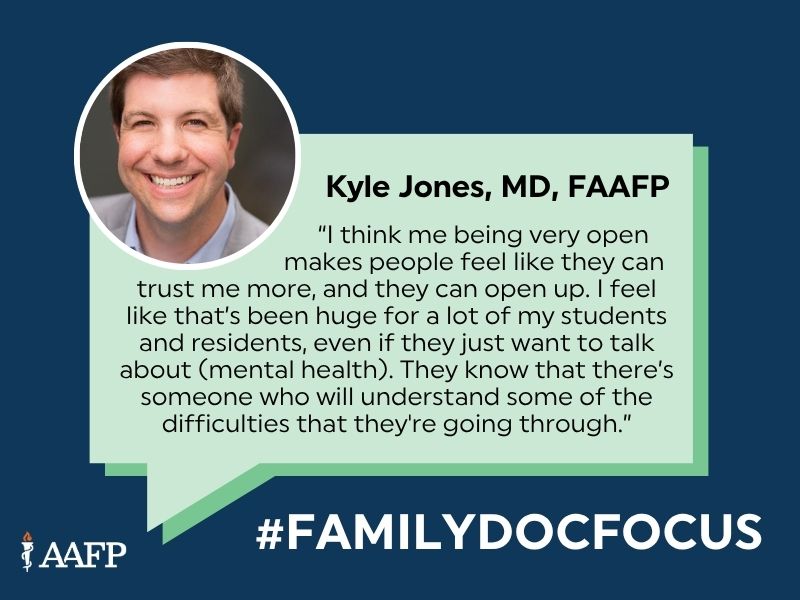‘Fallible’ doc: Talking about your mental health helps
Utah’s own Dr. Kyle B. Jones was featured in AAFP’s Family Doc Focus this month for Mental Health Month. The following was originally published in AAFP’s Family Doc Focus feature.
May 13, 2025, David Mitchell — Although roughly one-fourth of U.S. physicians experience clinical depression, few feel comfortable talking about it. Fears related to the licensing and privileging application process often create a culture of silence, leading to delays or avoidance in care.
“I was never really ashamed by it, even though society told me I should be,” said Jones, author of Fallible: A Memoir of a Young Physician’s Struggle with Mental Illness. “Writing the book was therapeutic. I was able to come to terms with things that had happened to me throughout medical education as well as some of my baseline issues. There were things I had tried to ignore or didn’t take as seriously as I should have. Going back and pondering it and working through it really helped me get to a much better place emotionally.”
Jones experienced anxiety as an undergraduate and depression as a family medicine resident. Although he was accepted to multiple medical schools, he suffered with imposter syndrome.
When Jones started to talk about his issues, he found out he wasn’t alone.
“I didn’t realize how common this is,” he said. “I began to realize that we need to get this message out there, and I knew that the benefits would outweigh any of the negatives.”
Fallible hit bookstores and websites in 2020 just as the pandemic was adding fuel to the epidemic of physician burnout.

Jones, an associate clinical professor of family and preventive medicine at the University of Utah School of Medicine, said sharing his story made him a more effective mentor.
“I think me being very open makes people feel like they can trust me more, and they can open up,” he said. “I feel like that’s been huge for a lot of my students and residents, even if they just want to talk about it. They know that there’s someone who will understand some of the difficulties that they’re going through.”
Jones knew he wanted to become a doctor after his mother was diagnosed with breast cancer while he was in high school.
“She saw a lot of doctors,” Jones said. “When she would return from the doctor, I could tell what kind of interaction she had with the doctor depending on her mood. It wasn’t that they had given her good news, that she was happy and it was OK. It was the way the doctor interacted with her and connected with her. That really stuck out to me as a powerful thing that was really cool. I wanted to be a part of that.”
After completing residency at the University of Utah School of Medicine in 2012, Jones became associate medical director for primary care at the Neurobehavior HOME Program for people with developmental disabilities. In 2019, he became its associate medical director of utilization management.
“I’ve been on this journey and have loved it,” he said. “I feel like these are my people, and it’s just been a great fit for me.”
Last year, Jones was appointed the Dr. Nymphus Frederick Hicken, Alta Thomas Hicken and Margarete Stahl Wilkin Hicken Endowed Chair in the Department of Family and Preventive Medicine. The five-year appointment will allow Jones to devote more time to researching clinical care for people with developmental disabilities and creating training courses based on his findings. He also is working with students from medical, physician assistant and nurse practitioner schools across the state.
Jones said interacting with this patient population was easy for him, but that isn’t always the case.
“I’m always surprised at how many physicians feel uncomfortable around people with developmental disabilities,” he said. “Even if the only thing we could accomplish is getting students more face time to interact with these individuals, I think the benefit would be huge. How do you communicate with these individuals? How do you communicate with their caregivers? But also, what are some of the medical and psychiatric needs they face that may be different from the general population?”
Meanwhile, Jones is still writing. In 2022, he published HOSPITAL!: A Medical Satire of Unhealthy Proportions. He also has launched a medical satire newsletter that is updated weekly. A father of four kids aged 9 to 20, Jones also authored When All Hope Seems Lost: A Gospel Perspective on Mental Illness in Youth, a book specifically for teenagers and their parents who are members of The Church of Jesus Christ of Latter-Day Saints.
May is Mental Health Awareness Month. Jones, who still meets with a therapist, said he encouraged people to talk about their mental health.
“We don’t do a great job when someone comes to us and says, ‘Hey, how are you doing? How can I help?’” he said. “We often don’t accept it. So, I would say accept the help that is offered and connect with other people. Even if you’re not pursuing formal treatment, just talking about it really does make a difference and can get you going in the right direction.”
